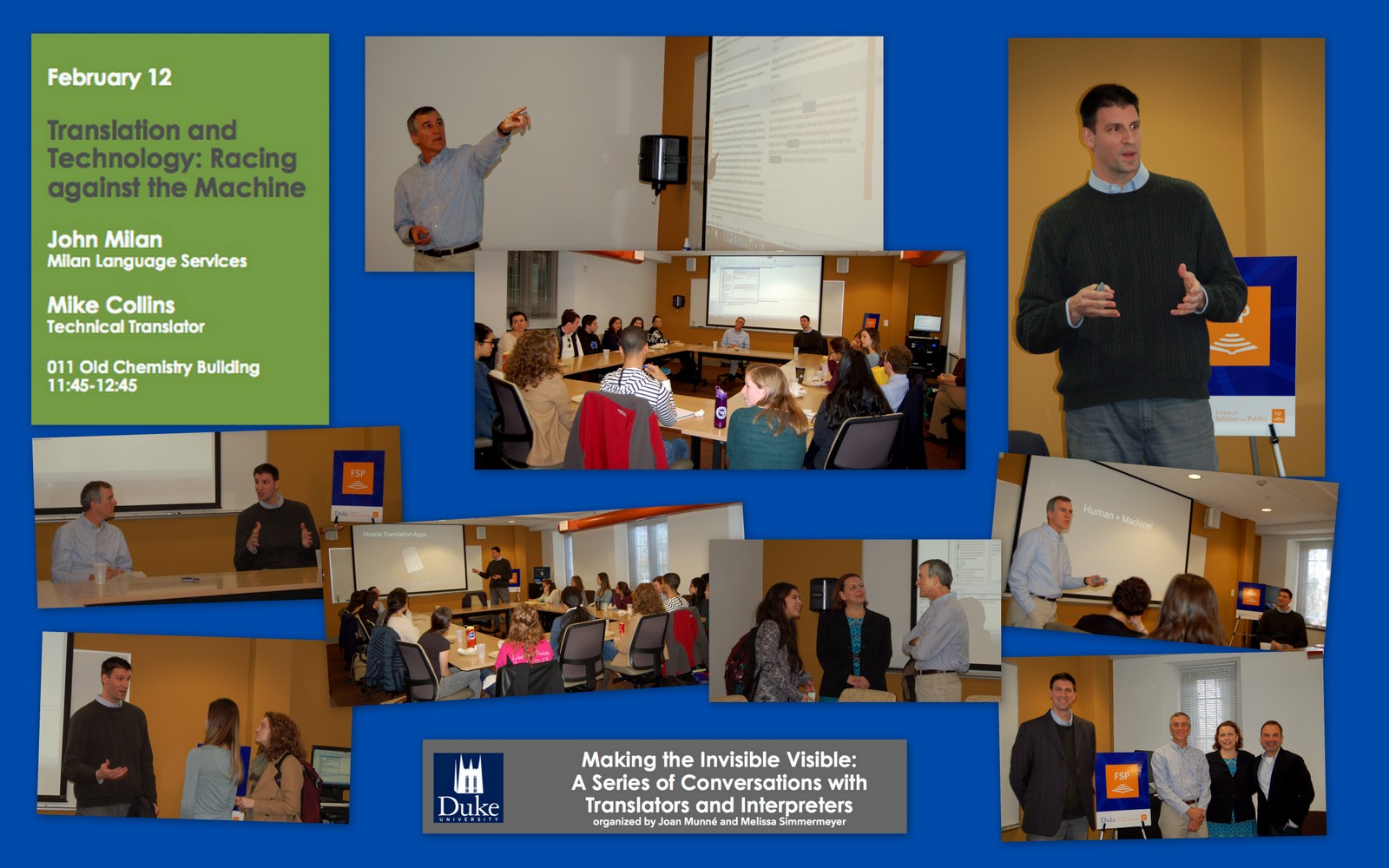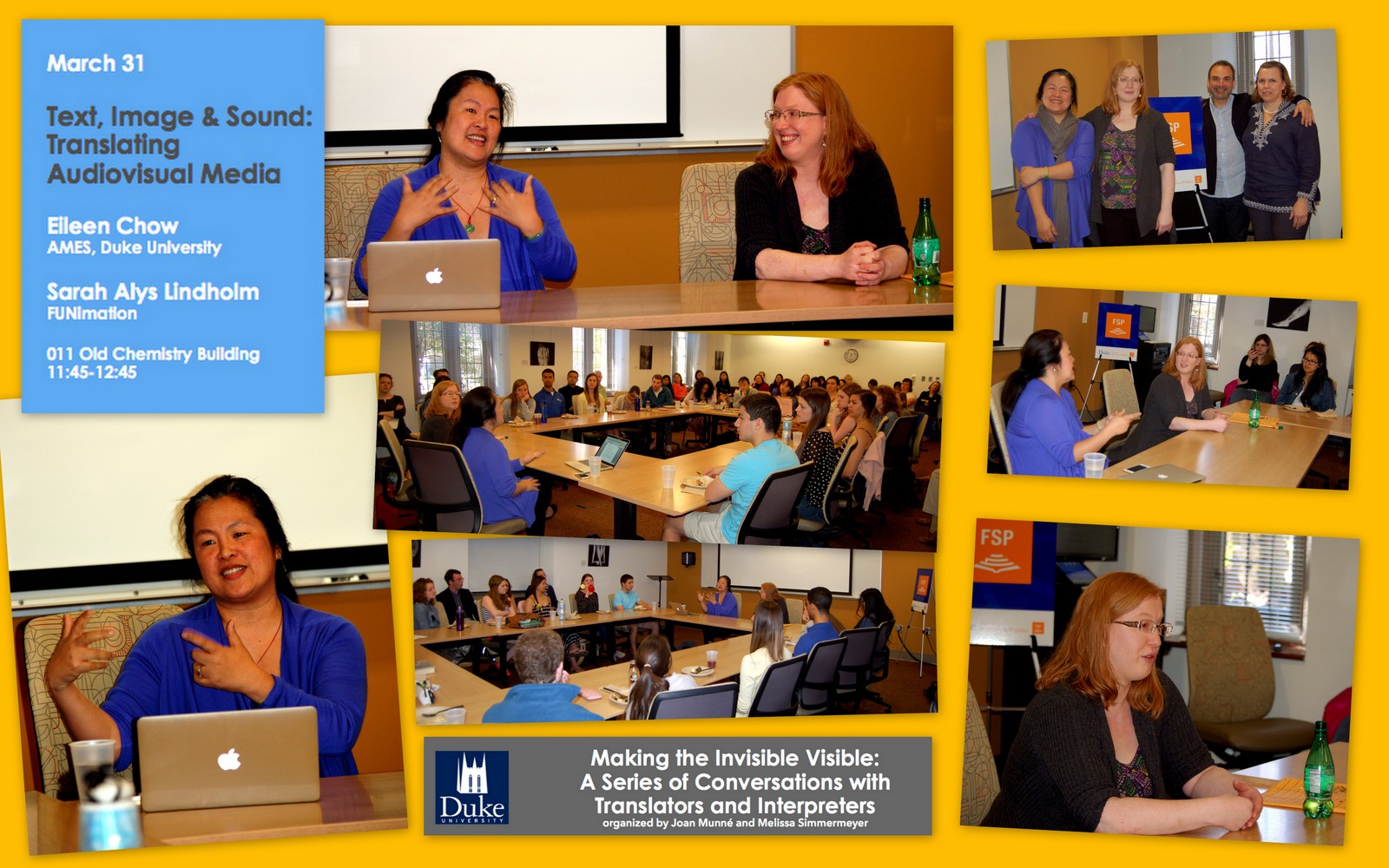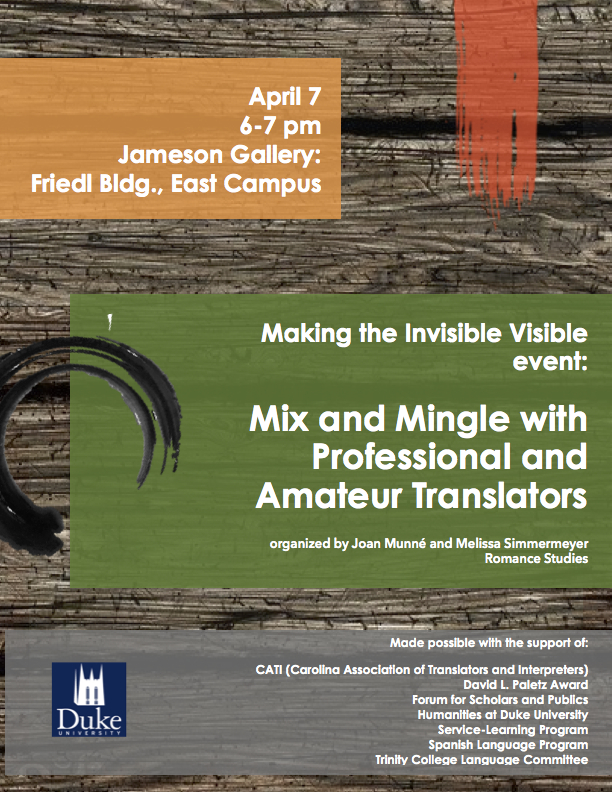“The speakers series was a hugely pleasant surprise. Each one of those talks was EXTREMELY interesting and each one I walked out of and continued to talk about with my friends in the class. It was so interesting seeing how what we were learning was actually applied in the real world (even if the languages weren’t always Spanish). I felt this was hugely important, because so often in college it feels that us as students either lose sight or don’t see the bigger picture when it comes to how what we’re learning can be applied in the real world. By you having these speakers come and describe the various niches for translators it helped paint a picture of what could be done with such a skill.” EL
1/22/2015 The Interpretive Dance: Decisions Interpreters Make
Students’ quotes after conversation:
| English | Español |
| “I LOVED the talk with the interpreters. It really inspired me to see how the skills that we learned in the classroom match up with the real world, and the passion they have for what they do is very clear. I didn’t know that one interpreter could cover such a broad range of specialties and it made me very happy to see examples of people who still get excited about doing their job.” [EAB] | “Me ENCANTÓ la charla con las intérpretes. Me inspiró mucho ver cómo las destrezas que aprendimos en el aula corresponden al mundo real, y la pasión que tienen por su carrera fue evidente. No sabía que una sola intérprete pudiera cubrir una gama tan amplia de especialidades y me alegró mucho ver ejemplos de personas que todavía se emocionan cuando regresan al trabajo.” [EAB] |
| “One of the things that really caught my attention was recognizing that even though an interpreter may be the most important person in the room, the crucial link between different people, the key to allowing communication to flow between two people that speak different languages, he or she is probably also the most invisible person of all. The irony of this fact made me think. Even though it seems that the work interpreters do requires them to act like machines, I don’t think they should be seen like machines. They deserve more appreciation for their abilities.” [MS] | “Una de las cosas que me llamó la atención fue reconocer que aunque un intérprete pueda ser la persona más importante en un cuarto, la conexión crucial entre gente diferente, la pieza clave para que haya comunicación entre dos personas que hablan idiomas diferentes, él o ella también bien puede ser el/la más invisible. La ironía de esto me hizo pensar. Aunque parece que el trabajo de los intérpretes requiere que actúen como máquinas, no pienso que deban verse como máquinas. Merecen más aprecio por sus habilidades.” [MS] |
2/12/2015 Translation and Technology: Racing against the Machine
Students’ quotes after conversation:
| Español | English |
| John Milan y Mike Collins plantearon que la tecnología es esencial para facilitar el proceso de traducción. Aunque nosotros, como traductores amateur, no usamos tecnología especializada como CAT, tenemos acceso a una gran variedad de tecnologías útiles para los traductores novatos. Sin embargo, dicha tecnología no puede hacerlo todo. Como argumentaron Milan y Collins, una maquina no puede crear una traducción perfecta. A pesar de la importancia, crecimiento y avance de tecnología, el proceso de traducir sigue requiriendo el elemento humano. (EDH) | John Milan and Mike Collins declared that technology is essential for facilitating the translation process. Even though we, as non-professional translators, do not use specialized technologies such as CAT, we do have access to a great variety of technologies that are useful for beginning translators. However, technology cannot do everything. As Milan and Collins contended, a machine cannot create a perfect translation. Despite the importance, growth, and advances in technology, the process of translation continues to require human intervention. (EDH) |
3/31/2015 Text, Image and Sound: Translating Audiovisual Media
Students’ quotes after conversation:
| Español | English |
| Las panelistas hablaron sobre varias cosas importantes en cuanto al trabajo con los proyectos audiovisuales. Antes del panel, no había estado expuesta a la industria del anime y considero que es un producto muy específico, aprendí estrategias generales que se pueden seguir al trabajar con cualquier proyecto audiovisual. Por ejemplo, al tratar de traducir películas o programas de televisión, no se puede traducir del guion, sino que es aconsejable hacerlo a partir de la pantalla y observar los comportamientos y las reacciones de los actores.Se debe tener en cuenta la audiencia meta para poder hacer una traducción precisa siéndole fiel a la obra original. Es interesante saber que la traducción audiovisual es un poco diferente a la traducción de poemas u otros textos literarios, pues se pierde la necesidad de serle fiel al guion para poder producir un producto que sea del gusto del público meta. Por ejemplo, al traducir una película japonesa de los cincuenta, el traductor tiene que llegar a aceptar que varias referencias culturales se tienen que cambiar para que tengan sentido y entretengan a la audiencia actual. (KB) | The panelists spoke on several important matters regarding work with audiovisual projects. Before the panel I had never been exposed to the anime industry and though I consider it to be a very specific product, I learned several general strategies to follow when working with any audiovisual project. For example, when attempting a translation of a film or a television show, you cannot translate from the script, but instead it is advisable to do it based on what you see on the screen, and to observe the behavior and reactions of the actors. You should bear in mind the target audience in order to achieve an accurate translation that is faithful to the original piece. It is interesting to note that audiovisual translation is a little different than the translation of poems or other literary texts, since there is less need to be faithful to the script in order to create a product that adapts to the taste of the target audience. For example, when translating a 50s-era Japanese film, a translator must come to accept that several cultural references will need to be changed in order to make sense to and entertain the current audience. (KB) |







